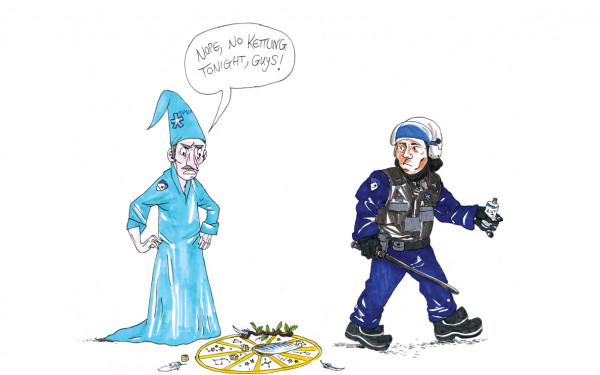Women’s Collective Condemns Montreal Police-CBSA Collaboration
Promise of a Sanctuary City Changes Little: Protestors
Nine months after Mayor Denis Coderre declared Montreal a sanctuary city, a small group of masked women with the Non-Status Women’s Collective came to city hall in protest to say that that not enough has been done.
In February, the city pledged to allow undocumented people the freedom to use services provided by the city without risk of being reported to immigration services.
Other promises were made by Coderre saying undocumented people would have more access to housing, would be free to call the police without fear, and that municipal employees serving non-status people would be properly trained on how to work with non-status people.
Many of the promises laid in the declaration have yet to become materialized. These women also say the declaration is empty since Montreal police still continue to work in collaboration with the Canadian Border Services Agency. As a result, many non-status people are still being deported.
A number of women spoke on the condition of anonymity, since being in the public eye can put them at risk of deportation.
“The SPVM, who take orders from Coderre, continues to collaborate with the CBSA,” said one masked woman. “We’re here to remind the city what a real sanctuary is: no collaboration with the CBSA!”
3_900_1350_90.jpg)
“Unfortunately nothing’s been done, we still have the same problems, it’s all the same as before,” said one non-status woman from Cote d’Ivoire, who came to Canada four years ago but was unable to get refugee status.
She chose to come to Canada because she heard the country was open and welcoming of new immigrants, but now she lives in fear. She worries about the possibility of having to interact with police officers, because she’s heard stories of people being deported after being stopped or because of small infractions.
“I live my life in hiding,” she says.
She wishes she could have access to legal work, but instead she’s only able to work two days per week at a job that pays less than minimum wage. With the amount she makes, she says she’s only barely able to pay for her rent and groceries.
The collective, a support group for women without status, is demanding that the Montreal police end their collaboration with the CBSA. For them, the declaration remains empty until this change is made. They also want more access to legal work, affordable health care, and an education at all levels, so that they can live their lives with dignity.
Even if the city lived up to all the promises made in their February declaration, this collaboration is unlikely to end, since the city never intended to push police to end their collaboration with the CBSA in the initial declaration.
In a previous interview, The Link asked the city if the Montreal police would consider ending their collaboration with the CBSA, but spokesperson for the city Linda Boutin declined to comment.
Montreal police say they can’t fully end their collaboration with the CBSA, since Canadian police officers are obliged under federal law to enforce immigration warrants. Assistant director with the SPVM Daniel Touchette also said those who have criminal charges, or who are facing security-related charges, will be liable to being reported to the CBSA—even if the CBSA hasn’t issued a warrant for their deportation.

1_900_600_90.jpg)
2_900_600_90.jpg)


1_600_375_90_s_c1.jpg)

_600_375_90_s_c1.jpg)